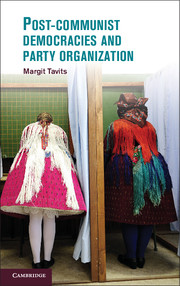5 - Power within Parties
The Consequences of Subunit Organizational Strength
Published online by Cambridge University Press: 05 June 2013
Summary
The evidence so far indicates that party organizational strength is positively associated with party institutionalization in new democracies. A strong organization is advantageous both in terms of winning and maintaining electoral support, and disciplining party elites to stay loyal and unified. Given these positive consequences, why do not all parties build strong organizations? This chapter and Chapter 6 present some potential answers to this puzzle. Specifically, in this chapter I consider how organizational strength disaggregated to the party subunit (i.e., branch) level affects the power distribution within parties. If organizational strength pulls power away from the center to certain branches, then party leadership may be reluctant to make organizational investments. In Chapter 6, I will further examine a number of other factors, such as the role of party ideology, environment, and leadership style. These may influence the extent to which the party sees the organization as a benefit or a burden, and thereby determine the level of its organizational strength.
How organizational strength affects power distribution within parties also helps address questions of broader theoretical interest that extend beyond the context of party institutionalization in new democracies: How is power distributed within political parties and what are the effects of the power distribution? The internal life of parties is, in general, relatively unexplored in the otherwise voluminous literature on political parties. It is common to treat parties as unitary actors and ignore their internal diversity despite frequent calls to account for it (Laver 1998; Laver and Schofield 1998; Strom 1990). At the same time, parties’ internal power distribution is important for understanding the dynamics of party behavior.
- Type
- Chapter
- Information
- Post-Communist Democracies and Party Organization , pp. 130 - 152Publisher: Cambridge University PressPrint publication year: 2013



